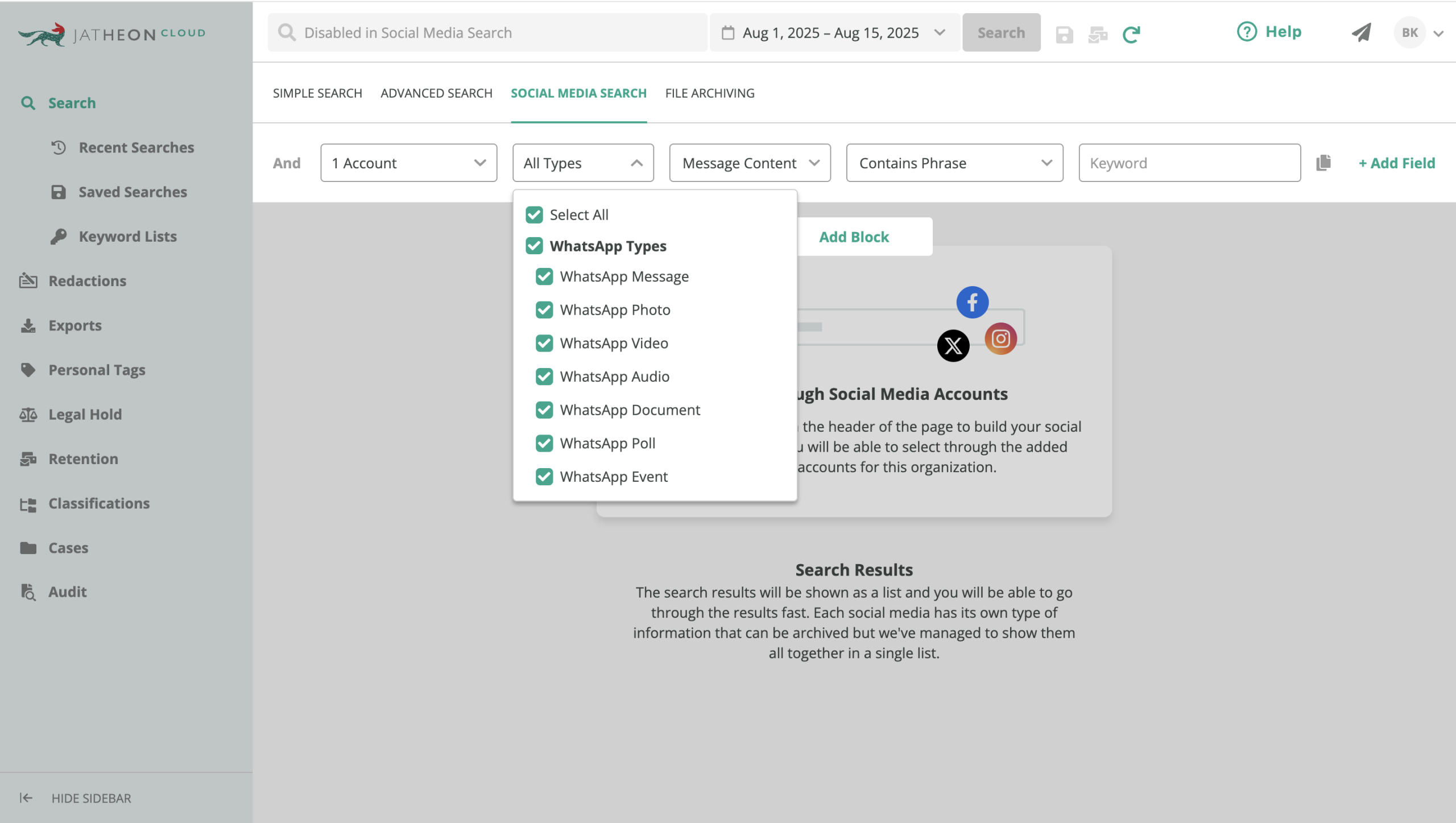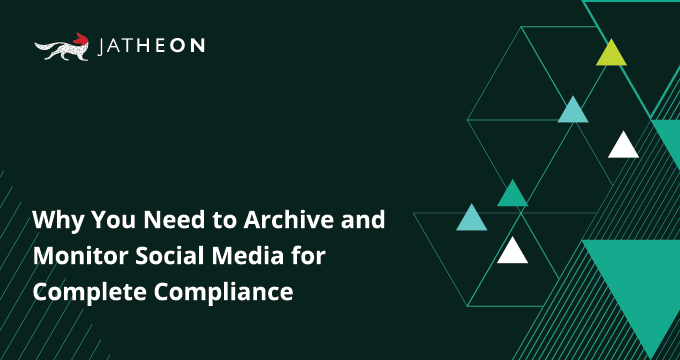Modern businesses rely on messaging apps like WhatsApp to communicate with clients, employees, vendors, and partners.
With over 2.95 billion active users, WhatsApp is convenient and popular. But for organizations in regulated industries, using it without a structured and compliant archiving process can quickly turn into a legal and regulatory minefield.
In this guide, we break down:
- What you need to archive WhatsApp for compliance
- Why third-party tools are better than WhatsApp’s own archive feature
- Things to keep in mind when choosing vendors
What Is WhatsApp Archiving for Compliance?
WhatsApp archiving for compliance refers to the automatic, tamper-proof capture, storage, and indexing of WhatsApp messages, including texts, images, videos, voice notes, call logs, and metadata, as official business records.
These archives serve as a reliable source of truth in case of:
- Regulatory audits (e.g., SEC, FINRA, HIPAA)
- Freedom of Information Act (FOIA) or public records requests
- Legal discovery and litigation
- Internal HR investigations
- Data retention and audit trail requirements
Unlike WhatsApp’s native backup or export features, compliant WhatsApp archive captures messages in real time, stores them in immutable formats (such as WORM storage), and makes them searchable, traceable, and legally admissible.
WhatsApp Compliance Regulations
Courts have increasingly ruled that WhatsApp messages are subject to the same discovery standards as email, underscoring the need for careful archiving practices.
Here’s a breakdown of some U.S. and European laws that require that organizations archive WhatsApp records:
- MiFID II (European Union) — Markets in Financial Instruments Directive (MiFID) requires the recording of any electronic communications including “email, SMS, business to business devices, chat, instant messaging and mobile device applications.”
- FCA (United Kingdom) — Financial Conduct Authority (FCA) has sent a strong signal to companies in the financial services industry that it intends to monitor WhatsApp usage for business purposes.
In the U.S., WhatsApp use is regulated by:
- FINRA Rule 4511 — “Every firm that intends to communicate, or permit its associated persons to communicate… through a text messaging app or chat service must first ensure that it can retain records of those communications as required by SEC Rules 17a-3 and 17a-4 and FINRA Rule 4511.”
- SEC Rule 17a‑4 (United States; under the Securities Exchange Act) — Requires broker‑dealers to preserve “communications relating to their business,” including messaging apps such as WhatsApp, and make them available upon request for the SEC’s investigation.
- HIPAA Privacy Rule — Provides individuals with the right to access their protected health information maintained in “designated record sets” — which includes electronic communications like messages when used by covered entities or business associates.
- FOIA (Freedom of Information Act) — Defines “records” broadly as all agency records, whether paper or electronic—and agencies must disclose them unless an exemption applies.
Bottom line: These regulations mandate that organizations, especially those in regulated industries, need to retain and be able to produce business records exchanged via chat apps.
With such strict compliance rules and the risk of WhatsApp misuse, businesses needed a way to manage their communications. The solution came in the form of technology allowing them to capture and archive WhatsApp the same compliant way they already archive email.
But why not archive them in WhatsApp itself?
WhatsApp’s Internal Limitations
WhatsApp is encrypted and reliable for personal use, but it falls short when it comes to enterprise compliance.
Here are the key reasons why native WhatsApp archive features are insufficient:
- No enterprise-grade retention — WhatsApp offers backups for user convenience, not for regulatory compliance. You can’t set message retention timelines, apply legal holds, or enforce deletion rules.
- Missing metadata and audit trails — WhatsApp export tools omit essential metadata such as timestamps, sender/receiver IDs, delivery status, and message edits. These are all critical for authenticity and legal defensibility.
- No search or centralized access — There’s no way to centrally search across multiple users or devices. This makes ediscovery, public records requests, or policy enforcement incredibly time-consuming.
- Deleted messages aren’t retained — Once a user deletes a message, there’s no way to retrieve it unless an archiving system captures it beforehand.
- BYOD risk — If employees use personal phones for work, there’s a serious risk of capturing private messages unless proper boundaries or tools are in place.
- Disappearing messages — Users can send messages that disappear after a certain time. That’s helpful for personal privacy, but it creates potential for misuse and problems for companies that need to keep records for compliance.
Why Use a Third-Party WhatsApp Archiving Solution
WhatsApp’s built-in archive is fine for personal chats, but it doesn’t meet compliance standards. Contrary to that, third-party archiving tools come with a specialized feature set and are built to capture and retain business communications in a fully compliant way.
These features include:
- Message capture — Captures all messages, images, videos, and voice notes in their original form, even if edited or deleted.
- Secure storage — Archives data with end-to-end encryption and redundant cloud backups.
- Cross-platform support — Archives messages from all WhatsApp-enabled devices, with insight into which device was used.
- Message search — Supports keyword and operator-based search to quickly locate relevant messages.
- Export options — Allows selective export of messages and chats in formats like PDF or HTML.
- Retention policies — Enables automated retention and deletion based on message age or custom rules.
- Unified storage — Consolidates WhatsApp, email, and social media archives in one central platform.
WhatsApp Archive: Challenges of Technical Implementation
Capturing WhatsApp messages in a compliant and reliable way is not as simple as enabling backups or asking employees to export chats. The archiving system must overcome the following challenges:
Separate business and personal communication
Most employees use the same WhatsApp account for personal and business conversations. Without clear separation, any attempt to capture messages risks privacy violations.
Vendors must offer tools that:
- Distinguish between personal and business chats
- Respect privacy laws and user consent
- Allow companies to enforce corporate usage policies
Have end-to-end encryption
WhatsApp’s encryption protects user privacy but complicates data capture. Solutions must intercept messages:
- At the device level (e.g., via a companion app or MDM solution)
- Through the WhatsApp Business API
- Without violating WhatsApp’s terms of service
Capture deleted or edited messages
For full compliance, messages must be archived the moment they’re sent or received, even if later deleted or edited. This ensures the archive reflects the original message history and captures any attempts at evidence spoliation.
Enforce retention policies
Most regulations specify how long messages must be retained. Solutions should:
- Allow admins to set retention rules (e.g., 7 years for SEC compliance)
- Apply legal holds
- Prevent unauthorized deletion or tampering
Ensure searchability and ediscovery readiness
Messages must be:
- Indexed and full-text searchable
- Exportable in standard formats (e.g., PST, PDF)
- Filterable by date range, user, keywords, or channel
Support BYOD and corporate devices
Organizations must decide whether to:
- Issue company phones with WhatsApp Business installed
- Use containerization on BYOD devices
- Mandate business-only numbers for WhatsApp use
Integrating with existing compliance systems
WhatsApp archiving solutions should integrate with:
- Email archiving systems
- Enterprise DLP and supervision platforms
- SIEM or audit logging tools
Checklist: How to Choose a WhatsApp Archiving Solution
When evaluating vendors, ensure they offer:
- Real-time capture of all message types (texts, media, voice notes, video notes, reactions)
- Capture of all edits and deletions
- Metadata preservation and legal audit trails
- Immutable storage with WORM capabilities
- Role-based access and policy management
- Full-text indexing and advanced search
- Support for BYOD and MDM integration
- Easy export for audits, investigations, or FOIA requests
- Integration with other archiving systems
Jatheon’s WhatsApp archiving solution runs on a secure AWS-hosted platform and captures all WhatsApp messages in real time, including edits and deletions. It provides organizations with the tools to search, manage, and export records when needed for compliance, legal, or internal review purposes.
Employees keep using WhatsApp on mobile or desktop like they always have. Behind the scenes, Jatheon captures all messages — group or private chats, text, media, audio and shared files, polls, events and even deleted messages.
Everything is indexed and archived automatically, either on its own or alongside email and other data sources your organization is using for internal and external comms. Once stored, the data is encrypted and assigned a retention policy based on your rules (e.g., “keep for 7 years”), after which it’s deleted — unless it’s under legal hold.
With Jatheon, WhatsApp data is captured directly from the source and archived in real time, without relying on exports or screenshots.
Everything stays searchable, secure, and ready when needed:
- Employees aren’t involved in the process, reducing error and saving time
- Automated retention ensures consistent policy enforcement
- In case of litigation or audit, chats are fully discoverable with metadata and timestamps
- Messages are stored securely and can’t be altered—meeting regulatory requirements
- You stay compliant with laws like FINRA, FOIA, HIPAA, and others
Summary of the Main Points
- If your employees are using WhatsApp for work, your organization is responsible for capturing, storing, and producing those communications during audits, legal proceedings, FOIA requests, or internal investigations.
- WhatsApp archiving for compliance means structured capturing of all business chat activity with metadata, secure storage, searchability and audit readiness—far beyond native export features.
- WhatsApp’s built-in functions fall short on timeline control, metadata retention, deletion scheduling, and search—making them insufficient for e‑discovery or regulatory use.
- Technical challenges include encryption, privacy concerns on BYOD devices, capturing deleted messages, and configuring immutable retention schedules.
- Implementing compliant WhatsApp capture mitigates risk, supports FOIA and audit readiness, and enables compliance supervisors and legal teams to work effectively.
- Staying compliant is the biggest reason businesses are looking for better WhatsApp archive solutions.
FAQ
Can WhatsApp messages be subpoenaed?
WhatsApp messages can be subpoenaed when requested as court evidence if they meet the right criteria of reliability, authenticity, and relevance to the case. These messages need to be produced with consideration to privacy, cost, and reliability.
What are the penalties for WhatsApp non-compliance?
Penalties range from regulatory fines, failed audits, reputational damage, to legal sanctions in court.
What regulations require WhatsApp archiving?
Some regulations that mandate WhatsApp archiving for compliance are SEC Rule 17a-4 and FINRA Rule 4511 (Finance), HIPAA (Healthcare), FOIA and Sunshine Laws (Government) and FERPA (Education).
Can archived WhatsApp messages be used in court?
Yes, if they were captured with proper metadata, stored immutably, and if they’re traceable for chain-of-custody purposes.
Is it good to archive chats on WhatsApp?
Yes, archiving WhatsApp chats is a good practice. Strict data retention laws require you to keep a record of WhatsApp messages for prolonged periods. WhatsApp can delete your messages, making it impossible to find them if needed for HR disputes, compliance, or other legal reasons.
Are WhatsApp messages confidential?
WhatsApp provides end-to-end encryption that keeps your messages and media safe from unauthorized access. However, if used for business purposes, it’s required to archive WhatsApp messages for increased security and record production.
Is WhatsApp Business compliant by itself?
Not by default. It enables APIs, but you still need a third-party archiving system to capture and store WhatsApp messages compliantly.
How can I manage employee privacy on BYOD devices?
If you need to capture WhatsApp for compliance, but protect employee private chat, you can require business-only numbers, use WhatsApp Business with containerization, and get employee consent with clear policy enforcement.
Can I use WhatsApp’s export feature to stay compliant?
No, WhatsApp’s export feature isn’t compliant for regulated industries. It lacks integrity controls, secure storage, and audit trails required for legal or regulatory standards. True compliance requires third-party solutions that capture, archive, and retain messages in tamper-proof formats.
Read Next:Why Archiving Text Messages and Mobile Communication Is So Important |











